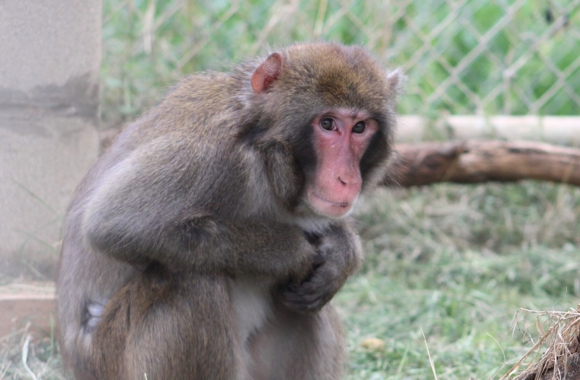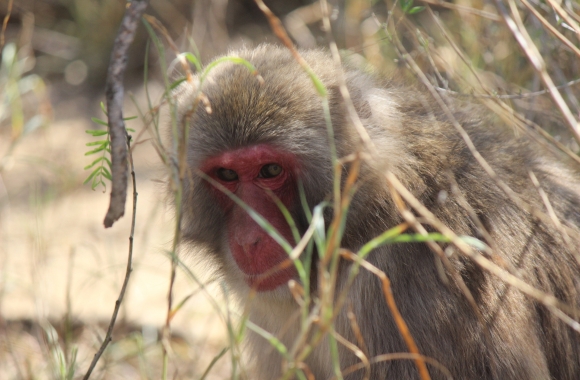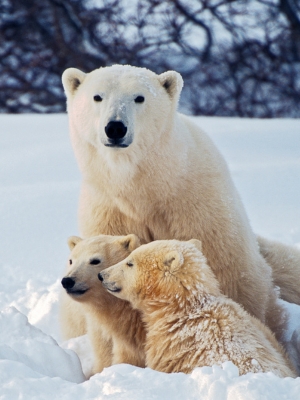Julian is a young Japanese macaque who was kept as a “pet” somewhere in Texas. Confiscated by law enforcement, the beginning of Julian’s story is unknown. We came into his life after we were approached by the sanctuary who had helped see Julian rescued from the pet trade. That sanctuary found that Julian needed to be with other Japanese macaques as he had failed to integrate into any of their existing social groups of monkeys. When the sanctuary vet approached us to see if we could take the five-year-old youngster, we immediately accepted and began to make plans for his arrival.
We Consider Social Opportunities when Welcoming a New Monkey Resident
Like all new arrivals, Julian spent the first four weeks of his time with us in quarantine while we performed a health check and awaited his various test results to come back clear – which they did. Before agreeing to bring a new monkey to the sanctuary, we first have to work out which social group they might do well with. If we do not feel that we have adequate opportunities or space for them, we ask that they are rehomed to another facility. It would be irresponsible of us, and do a major disservice to the individual in question, if we brought someone in who then found themselves housed alone with no real social opportunities. Ex-pet monkeys have usually experienced complete solitude in their early years – it is our job to ensure that they can move forward with friends and no longer be alone when they come to live with us.
Of course, we can never know exactly how a monkey we have never met might interact with others, and we don’t know how existing residents will react to a new arrival. As such, we try to ensure we have a Plan A, a Plan B, a Plan C, and so on. While this planning process inevitably involves guesswork, thanks to the combined decades of experience that our team brings to these discussions, we are often able to effectively predict how social situations might shake out based on our knowledge of existing residents, the species and age of monkey, and their history.

Former Pet Monkeys Face Social Challenges
Most ex-pet monkeys develop stress-related behaviors known as stereotypies. These might include pacing, self-harm, overgrooming, extreme aggression, or extreme submissive behavior. For this reason, the process of integrating these individuals with others is a lengthy, often stressful, and sometimes frightening experience. The most we can often hope for in these cases is that we find someone – even if it is just one monkey – for the newest resident to be friends with. Our golden rule is that no monkey lives alone.
Integrating Julian into a Troop
For Julian, we devised an ambitious plan, which would see him experience life as close to “wild” as possible. Due to Julian’s age, he was a good candidate to be integrated into one of our 50-strong groups of Japanese macaques living in a five-acre enclosure. He was not too young to be overwhelmed and potentially bullied, but he was not too old to have passed the point that being introduced to such a large group might create dominance conflicts. If we could pull off this integration, Julian would be able to live with dozens of other monkeys. We hoped he might make friends with the mischievous group of young male monkeys who spent their days playing happily with one another in their spacious home.
For Julian, we devised an ambitious plan, which would see him experience life as close to “wild” as possible. Due to Julian’s age, he was a good candidate to be integrated into one of our 50-strong groups of Japanese macaques living in a five-acre enclosure. He was not too young to be overwhelmed and potentially bullied, but he was not too old to have passed the point that being introduced to such a large group might create dominance conflicts. If we could pull off this integration, Julian would be able to live with dozens of other monkeys. We hoped he might make friends with the mischievous group of young male monkeys who spent their days playing happily with one another in their spacious home.
Beginning by housing Julian alongside other Japanese macaques in a smaller enclosure, he quickly showed us that he knew how to safely interact with others. While he was timid around people, he instigated play with other monkeys and would respect his elders – something vital for him to understand to avoid being attacked for impertinence.
The next step was to move him to a contained space within the five-acre enclosure to see how he interacted with his future troop; again, through a fence-line.
Julian Started Making Friends Right Away
Amanzi, one of the older females known to be feisty and, frankly, a little bit mean, instantly took to the new guy and quickly befriended him. They would groom happily through the fence while chattering backwards and forwards. Having this ally was a boon for Julian as it meant he had someone high ranking to have his back. He also made friends with Venus, another female who was chosen to be his “buddy.”

So it was that, when Julian was let out into the larger space, he instantly took to his new home. His new friends kept an eye out for him and, at the time of writing, he has been living “at large” in his multi acre home for two weeks. For him, this is the best possible outcome and will allow him to live as close to a natural life as is possible in a captive setting. For our team, it is a joy to see someone go from the cruelty of the pet trade to the joy of being part of a true monkey troop.
Here’s to Julian and many years of happy companionship!
Keep Wildlife in the Wild,
Liz
Dear Reader,
We are a nonprofit committed to wildlife conservation, welfare, and rescue. Making resources free and widely distributed, like our news items, is an important part of our mission. If you found this article helpful, enjoyable, or enlightening, please donate to help keep these resources available, and Keep Wildlife In The Wild.
Thank You,
The Born Free USA Team

 Dear Reader,
Dear Reader,